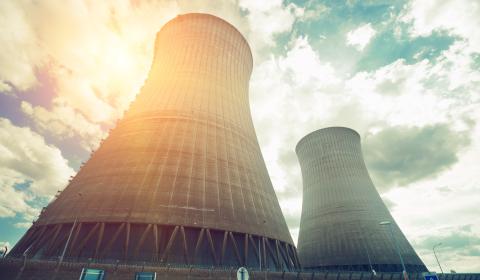Nuclear Powered Data Centers: Microsoft Bets on SMRs to Fuel the Cloud
January 9, 2024The internet's insatiable appetite for data is causing an energy crisis of its own. Data centers, the humming behemoths behind every Google search and Netflix stream are guzzling electricity at an alarming rate. Microsoft, recognizing this growing power crunch, is leading the charge toward a radical solution: powering data centers with small nuclear reactors (SMRs).
In October 2023, Microsoft posted a job opening for a "Principal Program Manager, Nuclear Technology." This role entails spearheading the advancement and execution of a worldwide strategy for Small Modular Reactors (SMRs) and microreactors. The primary responsibility involves leading the technical evaluation for integrating SMR and microreactor technologies to power the data centers housing Microsoft's Cloud and AI infrastructure.
But why nuclear?
Renewable energy sources like solar and wind are clean but weather-dependent. Traditional gas-fired power plants are reliable, but they belch greenhouse gasses. SMRs, however, offer an irresistible combination: constant, carbon-free energy in a compact package.
Think of SMRs as the mini-mes of traditional nuclear reactors. These self-contained units generate significantly less power (think small towns, not mega-cities), making them ideal for localized grids like data centers. The benefits are enticing.
Benefits of Nuclear Powered Data Centers
-
Unwavering Reliability
Imagine a world where servers don't blink even during the fiercest storms or hottest droughts. SMRs offer exactly that –– consistent, baseload power independent of weather fluctuations. Unlike wind and solar, which rely on sunshine and wind speeds, SMRs churn out their constant hum of electricity 24/7, 365 days a year. This means increased uptime for data centers, improved user service, and less worry about blackouts impacting critical operations.
-
A Greener Cloud
The insatiable energy appetite of data centers comes at a significant environmental cost. Traditional fossil fuels spew greenhouse gasses, accelerating climate change. SMRs, however, offer a powerful carbon-free alternative. Their emissions-free operation helps data centers achieve sustainability goals and contributes to a greener cloud infrastructure. This aligns with companies' environmental commitments and resonates with increasingly eco-conscious users.
-
Compact and Secure
Forget sprawling nuclear power plants. SMRs are much smaller, modular units ideal for localized grids like data centers. This compact footprint reduces visual impact and minimizes land use. Additionally, their self-contained nature enhances security. Unlike sprawling grids vulnerable to wide-scale disruptions, SMRs pose lower risks from grid failures or cyberattacks. This translates to improved data security and operational resilience for companies.
Beyond Microsoft
Microsoft's bold lead in SMR adoption for data centers is not a lone venture. Companies like TerraPower and NuScale are actively developing SMR technologies, while Standard Power plans to build the first SMR-powered data centers in the US. Governments are also recognizing the potential, with the US Department of Energy actively investing in SMR research and development. This broader support indicates a growing movement towards SMRs, promising wider adoption and faster technological advancements.
However, the road to nuclear-powered data is paved with challenges.
Challenges with Nuclear-Powered Data
Public perception: Nuclear energy still carries the baggage of past accidents, raising concerns about safety and radioactive waste.
Regulatory hurdles: SMRs are a relatively new technology, and getting them licensed and approved can be a lengthy process.
High upfront costs: Building and deploying SMRs requires significant investment, though long-term cost savings from reliable, clean energy could offset initial expenses.
Despite the hurdles, the potential rewards are substantial. A successful Microsoft experiment could open the floodgates for a new, clean, reliable data center power era. Imagine a world where tiny, nuclear-powered engines power your cloud-based life, humming away silently and safely in the background.
This is not just a technological shift; it's a fundamental rethink of how we power the digital age. The race is on, and Microsoft, with its bold nuclear bet, is at the forefront. Watch this space –– the future of the internet might be glowing green.
Prepare for a Nuclear-Powered Future with Capitol Tech
Microsoft's gamble is audacious, but it carries the potential to be a watershed moment in our quest for a sustainable digital future. If they can overcome the challenges and demonstrate the viability of SMRs for data centers, the floodgates could open for widespread adoption, fundamentally transforming how we power the online world's ever-growing demands.
Capitol Technology University, a leading institution in the field of technology, provides a diverse range of programs covering various industries. Our offerings include advanced studies such as the Master of Research (MRes) in Sustainability, Doctor of Philosophy (PhD) in Sustainability, and more. For additional details, feel free to reach out to our admissions team at admissions@captechu.edu.



